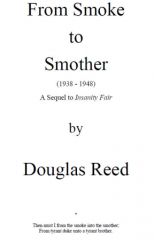
Author : Reed Douglas
Title : From Smoke To Smother (1938 - 1948) A Sequel to Insanity Fair
Year : 1948
Link download : Reed_Douglas_-_From_Smoke_To_Smother.zip
FOREWORD. Vienna 1938. When this book appears just ten years will have passed since the publication of the one, Insanity Fair, to which it is a sequel. The shape of events, as they have come about, may now be compared with the shape of the forebodings and warnings which filled Insanity Fair; and, when that has been done, the prospect of the next ten years, 1948-58 may be examined. Has the enpested air of the twentieth century at last been cleared? In my opinion the answer is plainly, No. The great choice between liberty and slavery remains to be made. We have merely passed from the smoke of the Thirties, through ordeal by fire in the Forties, to the dark smother that awaits us in the Fifties. Military victory in the second war was in the event turned against the shining cause for which it was begun: Liberty. The second war brought great generalship, but no statesmanship, only politicianship, and the acts of politicians, much more even than in the first war and the years that followed it, were misguided by hidden groups hostile to liberty and nationhood everywhere. I find certain changes in my own mind, when I look back on the man who wrote Insanity Fair in Vienna ten years ago. The memory of the first war and its huge carnage was lurid in me then and the obsessing premonition of a new slaughter did more than anything else to drive me to write that warning; horror and hatred of the tyrannies I saw rising in Europe were, I think, emotions secondary to that overwhelming anxiety. After ten years I find myself reversing the order of those fears. Though lives may be destroyed, life cannot be, for it eternally renews itself. Ruins are relatively unimportant, since human hands can always rebuild what human hands have razed. The annihilation of spiritual values now seems to me the most important thing to arrest. The ones I chiefly mean are religion, patriotism, liberty, human dignity and honour. The process of destroying these, begun in the Thirties, was quickened and extended through the second war. Its continuance now seems to me a prospect more dreadful than even that of ‘the third war’ which I hear people on all hands discuss. The worst prospect of all is that such a third war, like the second one, would be begun in the name of Liberty and be stealthily turned into one for the final extinction of liberty, while it went on. The mechanism of these twentieth-century wars has clearly been brought under remote control, so that such transformations are possible. We have now seen the trick performed twice. A few days before Insanity Fair appeared its warning was abruptly borne out by the German invasion of Austria, a thing which the public mind of the Thirties refused to imagine until it happened; I received some credit for having foreseen the blindingly obvious. The second war began then, although the fighting waited another eighteen months. We are in precisely the same state of suspended, non-fighting but undeniable warfare today, ten years later. The same possibilities of averting a fighting-war, of arresting the Gadarene process of the twentieth century, are open to us now, as were open then. That clamorous, fear-laden night in Vienna is foremost in my memory as I write this sequel, ten years later, to Insanity Fair. Among my farewells at that time was one I paid to a humble ragman who relieved me of the piles of yellowing newspapers which encumbered my lodging. He inhabited three vast cellars beneath on old house near the cathedral, the Stefansdom; built one below the other, they were the equivalent of a tall house buried underground, and from them passages led to the catacombs of that ancient city. He lived there, in the gloom, amid great mounds of sacks, round and on which prowled or sat innumerable cats. They were his skilled assistants: without them the rats would have eaten his business; and as we talked their inscrutable green and amber eyes watched us from all sides. Down there the noise of the howling mob overhead was muffled, a distant ominous cacophony, the theme-song of the mad twentieth century. This ragman was a civilised man; that was why I went to say goodbye to him. He nodded to the muted clamour with his head. ‘Listen,’ he said, ‘Heut’ Nazis, Morgen Kommunisten, und allezeit Idioten - Nazis today, Communists tomorrow, and idiots always.’ Were there more like him the Marats, Lenins and Hitlers could not prosper. I shook his hand and made my way homeward, through the Kaerntnerstrasse. That half mile of roadway, between the Stefansdom and the Ring, seemed to me the High Street of a civilised Europe then threatened with destruction (and now almost destroyed). Not even Rome or London, in our two thousand years, have seen as much of the process of alternating invasion, siege, battle, conquest, defeat, tyranny, liberation, recovery and Christian progress which is our common story, as the Kaerntnerstrasse in Vienna. On that night the voice, face and noise of the mob filled High Street, Europe, which leads to London as straight as it leads to Wiener Neustadt. How easy the mob has made the work of the wreckers! That mob-face appals me. Of the Gadarene swine, I imagine that each stampeding one wore the same expression of rapt admiration for the posterior view of the one in front. Why look elsewhere, and should not one always follow the swine in front? In these ten years I have seen the mob-face nearer home than I like. Ten years ago! Babies born that night are still children, boys then ten years old are still youths, youths of twenty are still young men: is it possible? It is fascinating to turn back the pages and in 1948 to compare the ten years, as they have been, with the ten years which that night loomed menacingly ahead. Having made that comparison, and thus having so much experience to guide the judgment, it is even more absorbing to contemplate the ten years which now lie before us all. To the writer of Insanity Fair they appear more ominous than the ten years looked which lay ahead that night in 1938. ...

Palmer Michael - Hiroshima revidiert
Author : Palmer Michael Title : Hiroshima revidiert Die beweise für napalm und senfgas anstatt...














